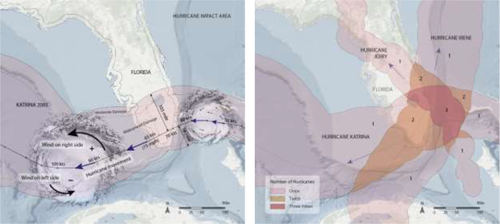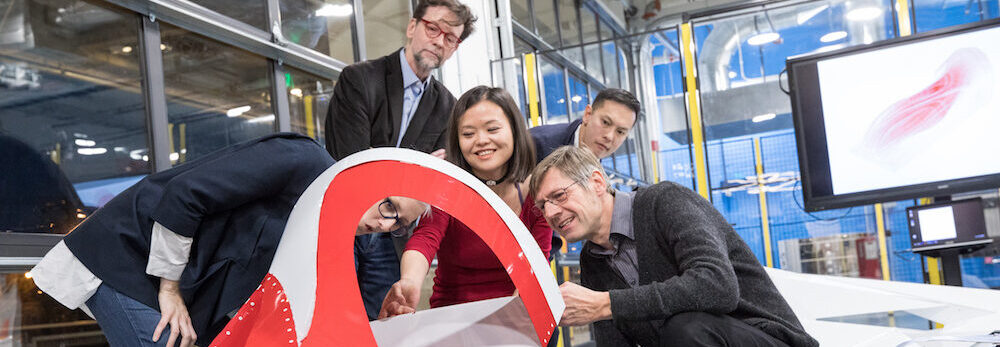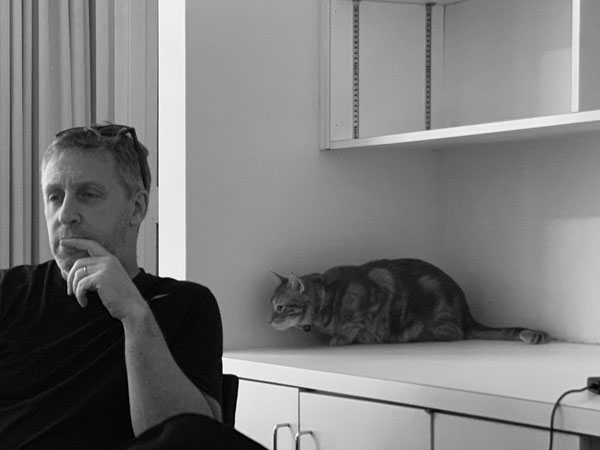Kim, Peiser analyze storm impact on housing values for Journal of Flood Risk Management
An article by Seung Kyum Kim (MDes ’16, DDes ’19) and Richard Peiser, Michael D. Spear Professor of Real Estate Development, analyzing how housing values in Miami‐Dade County have been impacted by storm frequency and intensity over the past three decades was recently published in the Journal of Flood Risk Management. “The Implication of the Increase in Storm Frequency and Intensity to Coastal Housing Markets ” is available to read for free through Wiley Online Library.
Publications by Blau, Eigen Shortlisted for 2020 CICA Bruno Zevi Book Award
The International Committee of Architectural Critics (CICA) recently announced its shortlist of titles for the 2020 Dennis Sharp CICA Awards . Among the seven candidates in the Bruno Zevi Book Award category are two book by Harvard Graduate School of Design faculty members.
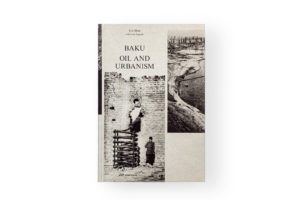
Baku: Oil and Urbanism (Park Books, Zurich 2019) by Eve Blau, adjunct professor of the history and theory of urban form and design and director of research, and Ivan Rupnik delivers an architectural study of the relationship between oil and urbanism with the Azerbaijan capital of Baku as focus. Learn more from the article “Further Reading: Eve Blau’s Baku: Oil and Urbanism.”

On Accident: Episodes in Architecture and Landscape (MIT Press, Cambridge 2018) by Edward Eigen, senior lecturer in the history of landscape and architecture, presents a series of essays on phenomena that fall outside the canon. It is the winner of a CHOICE Outstanding Academic Titles award for 2018.
The Bruno Zevi CICA Book Award recognizes published books on architectural criticism, theory, and history.
Martin Bechthold and Collaborators Earn University Climate Change Solutions Fund Grant
The Harvard Graduate School of Design’s Martin Bechthold has been honored with a research grant in the sixth round of Harvard’s Climate Change Solutions Fund (CCSF) , established in 2014 by President Emerita Drew Gilpin Faust to encourage multidisciplinary discovery around climate change. Bechthold and his three co-investigators, including the GSD’s Jonathan Grinham, were recognized for their project “Cold-SNAP: Cooling Your Building Without Heating Our World,” an effort toward designing better, more sustainable air conditioning for residential and commercial buildings.
Bechthold currently serves as director of the Doctor of Design Studies program and the Master in Design Engineering program, as well as the Kumagai Professor of Architectural Technology, while Grinham is a Lecturer in Architecture and Research Associate. With “Cold-SNAP,” Bechthold and Grinham are collaborating with Joanna Aizenberg, Amy Smith Berylson Professor of Materials Science and Professor of Chemistry and Chemical Biology (FAS/SEAS); Jack Alvarenga, research scientist at the Wyss Institute for Biologically Inspired Engineering.
As the Gazette observes, Bechthold and his collaborators aim to design build a better air conditioner, with a focus on developing co-extrusion ceramic manufacturing methods with a high-efficiency, retrofittable indirect evaporative cooling (IEC) system. The team intends their design to serve residential and commercial buildings in hot-dry and hot-humid climates.
Early-stage research has shown that cold-SNAP IEC systems “can achieve high cooling capacity with no added moisture and low system energy,” the Gazette writes. “The funding from the CCSF will help enable next-generation IEC systems and facilitate a full-scale pilot program with a ceramic manufacturer and potential industry stakeholders.”
Among the other projects supported by this year’s CCSF cycle include how the timing of clean-technology research and development interacts with the shapes and timing of policy-making and policy scenarios; efforts toward accelerating data science and data access on climate-change exposures in order to mitigate climate change’s health consequences; and new, more-accurate methods of quantifying forest canopy structure in order to support forest preservation and restoration projects.
CCSF aims to support and inspire the University’s transition from nonrenewable energy sources to a more-sustainable system. To date, 50 CCSF projects have received more than $6 million in University support; this year’s cycle awarded $1 million to eight projects.
“Harvard has made significant progress toward reducing emissions, improving health in the built environment, and shaping policies and industries in pursuit of a more sustainable future,” Harvard President Larry Bacow said on July 10, when the grants were announced. “Our goals — a fossil-fuel-neutral campus by 2026 and fossil-fuel-free campus by 2050 — are within our reach because our dedicated researchers and scholars are advancing knowledge and driving progress that connects and amplifies all of our sustainability efforts.”
Awarded just before Harvard closed its doors and gates in response to the COVID-19 pandemic, this year’s CCSF grants enabled recipients to begin their research and work in advance of camps closures. As the Harvard Gazette describes , CCSF’s review committee “targets innovative research projects at each of Harvard’s 12 Schools, giving special consideration to those that use the campus as a living laboratory. Eligible projects test ideas that address global sustainability challenges and align with the priorities in the with the priorities in the University’s Sustainability Plan and the climate goals outlined by Harvard’s Presidential Committee on Sustainability and the Office for Sustainability .”
At the GSD, Bechthold teaches courses in design robotics and material systems, building structures, as well as life cycle design. Bechthold’s research broadly looks at material and fabrication technology as a catalyst of innovation for design practice. In 2010 he founded the GSD’s Design Robotics Group and recently merged it into the Material Processes and Systems (MaPS) Group , a collaboration of faculty, research associates, and students that pursues sponsored and other research projects. Bechthold has also served as a key University faculty member in the development, launch, and advancement of Harvard’s collaborative Master in Engineering (MDE) degree program.
As Lecturer in Architecture and Research Associate, Grinham’s work asks how the design of conventional and emerging material technologies can address the question of energy and where we get it. This question has led to the development of novel technologies and publications around vascular-thin-film heat exchange, nano-scale thermal tuning, and the coupling of breathable materials to buoyancy-driven ventilation. These topics are complemented by Grinham’s other research interests that track themes in robotics, kinematic structures, embedded computation, and automated fabrication workflows.
Learn more about this year’s eight Harvard CCSF awardees via the Harvard Gazette .
Ron Witte appointed Professor in Residence of Architecture
Ron Witte has been appointed as Professor in Residence of Architecture at the Harvard Graduate School of Design (GSD) effective July 1, 2020. Witte served as Visiting Professor in the Department of Architecture this past academic year, and prior to that was Professor of Architecture and Baker Institute Scholar at Rice University. He has also held previous faculty appointments at Princeton University, the University of Kentucky, the Illinois Institute of Technology, and the University of Florida. Witte received his Bachelor of Architecture from California Polytechnic State University, San Luis Obispo, and his Master of Architecture from Princeton University.
Witte is no stranger to the GSD, having taught here for some years before taking on an appointment at Princeton. He has taught studio and seminar courses throughout his pedagogical career, in addition to redesigning the core curriculum at Rice. Likewise, in his new role at the GSD, Witte will help shape the Master in Architecture programs’ core-studio curriculum in response to a rapidly changing world. His approach to pedagogy holds that design and reflective writing are inextricably linked, and should represent two embodiments of a singular intellectual passion.
Witte is widely known for his contributions to the practice and theory of architecture, and for his dedication to teaching that has involved numerous innovations in architectural pedagogy. A co-founder of WW Architecture, alongside Dean Sarah M. Whiting, Witte holds primary responsibility for the practice, developed and integrated with a sophisticated theoretical base since its founding in 1999. WW’s work coheres under the concept of the architectural “figure”: an organizational and spatial instrument that balances specificity and open-endedness of spaces and programs. WW’s reflective practice model focuses on designing one project at a time, centering around the core values of architecture: plan, figure, and façade, both in buildings as well at the urban scale. The result has been highly original designs that have become recognized benchmarks, with work that has ranged across types from residential to institutional, and across scales from a single-family house to airfield-scale infrastructure.
Internationally recognized for its originality and accessibility, Witte’s work has been exhibited at the Roca Gallery in London, the Museum of Modern Art in New York, the Art Institute in Chicago, the San Francisco Museum of Modern Art, the National Building Museum, Harvard University, UCLA, the Rhode Island School of Design, the Graham Foundation, the International Center for Reflection on the Future in France, the Guggenheim Museum in New York, and the AIA Gallery in Houston.
In addition to the creativity and energy of his practice, Witte has written and published extensively for a variety of international audiences, in periodicals as notable and diverse as Assemblage, SeeSaw, Fresh Meat, Log, the Washington Post, Archplus, Scroope, Harvard Design Magazine , Architecture magazine, Dialogue, Architectural Design Profiles, and Polygraph. The drawings for WW’s “X House” were acquired by the architecture collection of the San Francisco Museum of Modern Art. Witte has edited several books including CASE: Toyo Ito: Sendai Mediatheque; Counting; and Judgment, and his essays have been included in influential overview collections. His writing serves both as a reflection of earlier work as well as a platform from which new work and ideas are being launched.
Witte’s public roles have included service on the Board of the Houston Arts Alliance and on the Houston Independent School District Task Force for School Design, and his work has been acclaimed in international competitions for public buildings and garnered a range of awards.
Prior to WW, Witte’s professional experience includes working with the Office for Metropolitan Architecture in Rotterdam; Jacques Couëlle in Paris, France; and Reid & Tarics in San Francisco. Witte is a registered architect in Massachusetts, California, and Texas. He holds National Council of Architectural Review Boards certification, and is a member of the American Institute of Architects.
Witte received his Bachelor of Architecture from California Polytechnic State University, San Luis Obispo, and his Master of Architecture from Princeton University.
The Nexus Podcast
As countless industries and sectors reckon with the aims articulated by the Movement for Black Lives and other aligned groups, the African American Design Nexus is on a mission to elevate the work and roles of Black designers. Founded in the wake of the GSD’s first Black in Design Conference in 2015, the Design Nexus is a collaboration between the school’s African American Student Union and the Frances Loeb Library. It’s a preeminent resource for those interested in the intersection of Blackness and design practices throughout the built environment as well as those represented in “public art, fashion, music, movies and other media.”

Now, its mission will be further animated by a new podcast featuring Black scholars, writers, designers, and educators. As hosts of The Nexus , GSD students Tara Oluwafemi and Caleb Negash aim to ensure that the podcast records and preserves the legacy of Black designers working today, and they plan to push the understandings of the boundaries of design in the most expansive ways possible. They anticipate that The Nexus will introduce listeners to designers who represent exciting interventions within the field, but who may not be household names yet. For Oluwafemi, for example, dream guests include Nigerian designer Mowalola Ogunlesi and acclaimed artists Toyin Ojih Odutola and Jacolby Satterwhite.
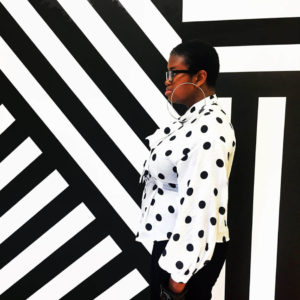
The Nexus’s inaugural episode features Boston-based architect, filmmaker, illustrator, and children’s book author Aisha Densmore-Bey . It is a conversation that ranges from what it means to be a polymath, to Densmore-Bey’s personal influences, to her relationship to art, joy, and beauty. The mood of this dialogue—an intimate, nuanced inquiry that critically traverses the geographies of design—is illustrative of what Oluwafemi and Negash seek to capture throughout the entire series. As the two continue to assemble a dynamic roster of interviewees, including Stephen Gray, De Nichols, and Bryan Lee Jr., they are looking forward to playing, experimenting, and sharpening their own skills as storytellers.
Ultimately, The Nexus will add to the broader intellectual ecology that is the African American Design Nexus and will contribute to the Loeb’s ongoing open access bibliography that makes available key texts related to “the intersection of race and design.” This effort of documentation, historicization, and preservation, as Oluwafemi and Negash explain to me, will be strengthened by the voices they plan to amplify and celebrate.
Summer Scholarship at the GSD
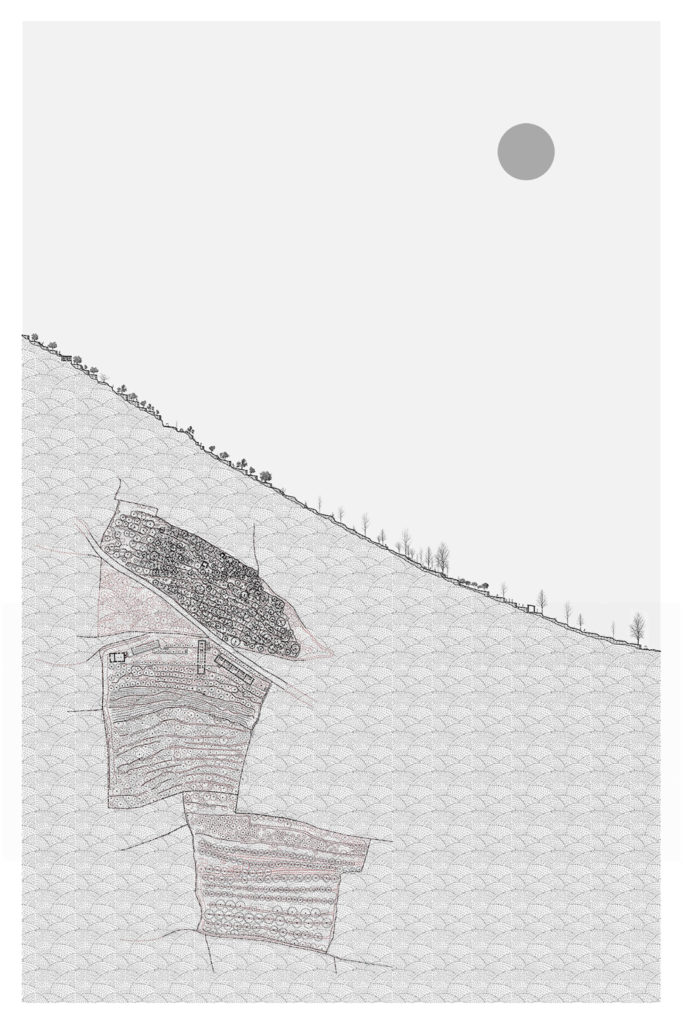
Existing Section and Proposed Interventions for an Agricultural Campus for La Carboncella, by Nicolás Delgado Alcega (MArch ’20)
The GSD introduces new summer opportunities and recharges long-standing ones, aiming to foster a productive summer despite pandemic-induced complications.
Cooperative farm organizations for BIPOC communities. Pandemic-proofed parks, offices, sidewalks, and restrooms. New strategies to ensure accuracy of census and GIS data in African cities.
While varied, these topics are united by design’s potential to intervene in precise ways, as well as by a fresh urgency given the consequences of the COVID-19 pandemic. They are among the 227 investigations that students and recent graduates will pursue this summer as the GSD introduces new avenues for academic and professional enrichment, and continues to consider the direction and process of design research in an altered global environment.
Amid office closures and precipitous unemployment levels, traditional summer work and learning opportunities have evaporated—especially for students and recent graduates. This dynamic introduces a double-headed challenge: how might students continue to advance their ideas while also gaining professional experience?
“Students have always used summer months to expand on what they’ve learned, by working in offices, partnering with peers on design competitions, traveling to see projects in situ, or advancing research,” says Sarah M. Whiting, Dean and Josep Lluís Sert Professor of Architecture. “The pandemic has eliminated many of these valuable opportunities, so we felt that it was critical to support our students, including those graduating into this difficult moment.”
At the heart of the GSD’s effort is the new Student Emergency Fund (SEF), launched on March 10, which provides summer research grants for GSD students and 2020 graduates, and ameliorates some of the logistical and practical complications stemming from travel restrictions. SEF’s research grants offer latitude and elasticity for students: there are no grades or credits to be pursued, no formal supervision required—though each recipient will offer a written summary of their research at its conclusion. In order to assist students in advancing their individual research, the Office of the Dean bolstered the research funds raised via SEF efforts with a matching donation.
Amid office closures and precipitous unemployment levels, traditional summer work and learning opportunities have evaporated—especially for students and recent graduates. This dynamic introduces a double-headed challenge: how might students continue to advance their ideas while also gaining professional experience?
“This was an opportunity, as a GSD family, to wrap our arms around our current students and take a specific action in the unprecedented moment of a global pandemic,” says Peggy Burns, Associate Dean for Development and Alumni Relations. “SEF highlights that the GSD is very much a community: alumni taking action to help support students, with our own faculty among those alumni who have so generously offered various forms of support.” The school’s community of alumni and friends has contributed directly to the SEF while also responding with enthusiasm to requests for increased internship opportunities for GSD students.
The GSD is also reshaping traditional summer offerings in order to pave new pathways toward students’ professional enrichment. Irving Innovation Fellows, selected annually, will collaborate with the GSD’s Innovation Task Force over the summer in order to conceptualize a digital learning environment more nuanced than the one generated this past spring. The school is also providing additional funding to enable teaching assistants to begin their Fall 2020 work during the summer, so they can provide support for courses pivoting to remote teaching and learning in the fall. And it is encouraging faculty to continue hiring students for summer research and design work.
The 227 students and recent graduates who will pursue research this summer are covering a range of topics and perspectives, many of which have been influenced by the ongoing COVID-19 pandemic. A snapshot of some of these projects and their early-stage germination reveals what GSD students have been pondering over the past few months, how they hope to make use of this unconventional summer, and why they consider their research essential given today’s conditions.
The future of co-working spaces
For years, Francisco Brown (MDes CC ’20) has been studying the real-estate models behind co-working spaces, as well as the broader implications of the so-called sharing economy. As more and more businesses shifted to remote-work arrangements this spring, Brown’s question suddenly transformed: instead of “How do co-working spaces work?,” he was asking, “Will they work at all?” And, if they can’t: What happens to all of that real estate?
“Even though co-working has evolved in a variety of operational and business models, co-working is, in principle, about the community, and its host spaces are about collaboration and proximity,” Brown observes. “The current conditions beg the questions: How can a business model that revolves around renting dense shared-office space stay afloat with social distancing rules and in the advent of what may be the worst economic crisis in a century? How can design research explore new ways to reuse, adapt, and speculate about these spaces in the face of the most significant cultural and economic shift in our times?”
To address these questions, Brown will work alongside research advisor Jacob Reidel, Assistant Professor in Practice of Architecture and a senior director at co-working start-up WeWork. Brown aims to first collect relevant news and data around regulations, analysis, and ideas on design responses to social distancing rules. He then plans to interview academics, co-working-space managers and designers, and organizational scientists to discuss the opportunities and challenges that co-working spaces are facing. Ultimately, he will consider design adaptation and typological hybridization for the millions of unused square footage of space that co-working chains currently hold.
Adapting Hawaii’s comfort stations in the face of COVID-19
Like offices, public restrooms are a cornerstone of urban and civic space, and they, too, have been stress-tested by the COVID pandemic. Kaoru Lovett (MArch ’20) had been researching Hawaii’s so-called comfort stations as a design expression of utilitarianism, one upon which architectural identities have been constructed. The comfort stations, which were conceived during the postwar boom years of the 1950s and 1960s, offered local designers an opportunity to bring regional materials and era-specific aesthetics into what would otherwise be generic, utilitarian public bathrooms.
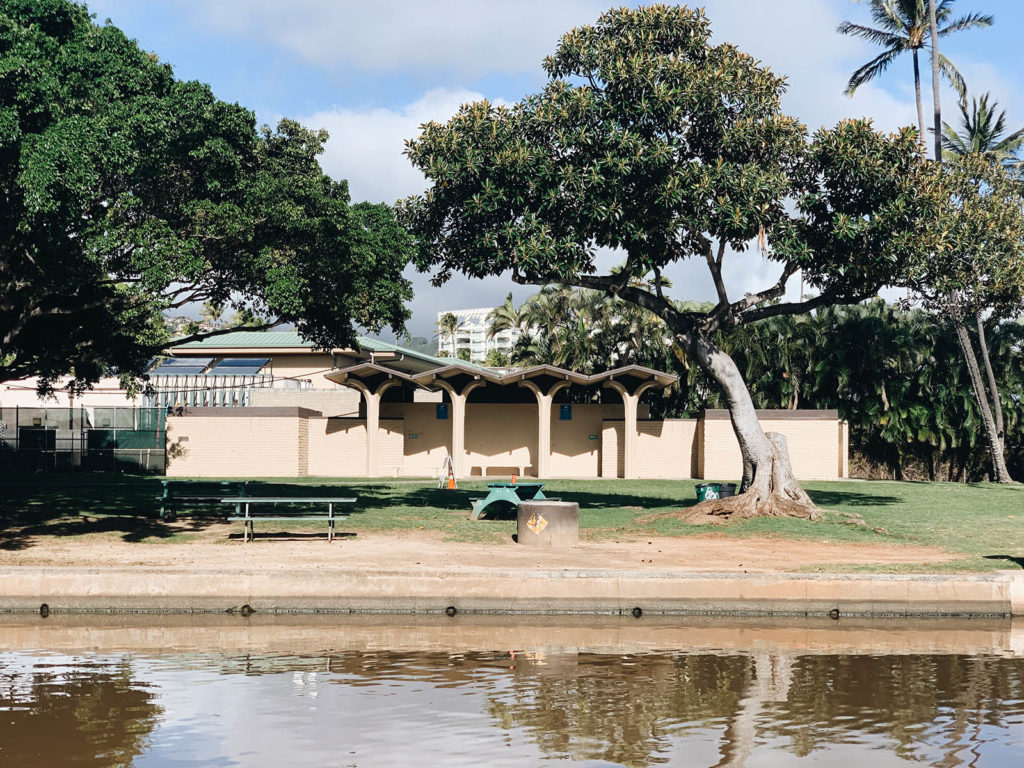
Waialae Beach Park comfort station. Photo by Kaoru Lovett
“The public comfort stations of Hawaii are an interesting precedent, as the scale and timeline of the public project was immense, nearly 200 pavilions over the span of 30 years,” Lovett says. “These pavilions were affiliated with a larger effort to shed light on the budding island destination, establishing some of the foundational work upon which the architectural identity of Hawaii is built.”
While Lovett had initially researched the relationship between the identity and the construction of comfort stations, now he’s wondering whether their inherent utilitarianism can satisfy today’s newly charged public-health concerns. Like Brown, Lovett has watched his original research interests reshape and gain dimension in light of COVID, though not fundamentally transform. This summer, he will examine—from afar—how to adapt Hawaii’s comfort stations to accommodate post-COVID standards of sanitation and social distancing.
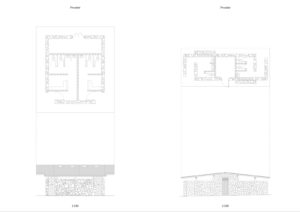
Pupukea Beach Park comfort station, and the Liliuokalani Garden comfort station drawn up referencing construction documents provided by the Honolulu Department of Design and Construction.
“My earlier interest with these public facilities as architectural ‘image’ models has coincided with the attention brought on by recent events,” Lovett says. “This creates an opportunity to approach these pavilions with a particular interest: construction logic and building imagery as strategies for resolving issues of public health.” Given Hawaii’s current plans for phased reopening of public spaces, the attendant need for safely designed public restrooms is growing in urgency.
Lovett anticipates that strategies revealed through his research process—whether they be methods of organization, construction, or technology—will find application in public restroom facilities more broadly. “My aspirations are that the specificity of this precedent will act as a platform to engaging in a larger discourse on public health and sanitation through our post–COVID-19 society,” he says.
Reimagining online space
For Emma Ogiemwanye (MUP ’20), a long-standing research interest in virtual presence has been supercharged in recent months. After a five-year stint at Google, Ogiemwanye arrived at the GSD aiming to explore how urban planning theory and practices might be applied to the Internet in order to help make digital spaces safer, more just, and more equitable. In other words, she wanted to consider how the skill sets of an urban planner, trained in analyzing complex issues of policy and governance and in addressing needs of communities, might be applied to the design of online spaces.
As part of her GSD thesis, Ogiemwanye created a taxonomy of strategies that some Instagram influencers invoke to subvert the normative performances featured on the platform. Her research centers on Black women influencers and explores the myriad ways they navigate and reimagine online space. She has taken particular interest in how these influencers have pulled digital levers to elevate joy, activism, and access to social capital and art through their content.
Ogiemwanye observed that COVID has pushed much of cultural life online. And it has simultaneously revealed health disparities across race, especially as Black Americans are suffering and dying in disproportionately high numbers. In that complex tangle, Ogiemwanye saw the dual narrative so familiar to Black America, queer people of color, and other multiply oppressed communities: creativity and ingenuity emerge in the face of danger and pain.
“Inequalities in access to safety and well-being are now plainly seen and are finally being decried in our physical world. My work stands to point out how dominant online platforms perpetuate these same extractive logics to maximize profit,” Ogiemwanye says. “I hope this transformative moment will result in us reimagining many systems, from housing to healthcare.”
With the support of faculty advisor Lily Song, Ogiemwanye plans to continue descriptively mapping social-media activity by observing how people move and interact online. She believes that she can help encourage what she describes as “more liberatory possibilities” for digital spaces. “This is, in part, a project to build better digital ecosystems as we increasingly spend more time online, while also capturing a snapshot of this unique moment in human history,” Ogiemwanye says. “Online platforms should be included in any list of structures requiring reinvention.”
New forms of food sovereignty
The pandemic has revealed numerous social structures and behaviors that require such reinvention, or at least reconsideration. Throughout the world’s food systems and networks, for example, changes in both work and consumption patterns introduced logistical logjams and supply shortages, highlighting ongoing concerns over labor, supply, equity, and security. Over the course of her GSD studies, Adriana David Ortiz Monasterio (MDes ADPD ’21) has been investigating food sovereignty—explained broadly as the right of a community or a people to define and control the systems and policies that produce the food they eat. She has focused especially on the diversity and conservation of heirloom seeds.
A Fall 2019 GSD course, “The Landscape We Eat” with Montserrat Bonvehi Rosich, had inspired David to assess the full network of food chains and their inherent social and environmental impacts. And Malkit Shoshan’s Spring 2020 studio, “Interdisciplinary Art and Design Practices,” motivated David to apply design in order to engage social issues.
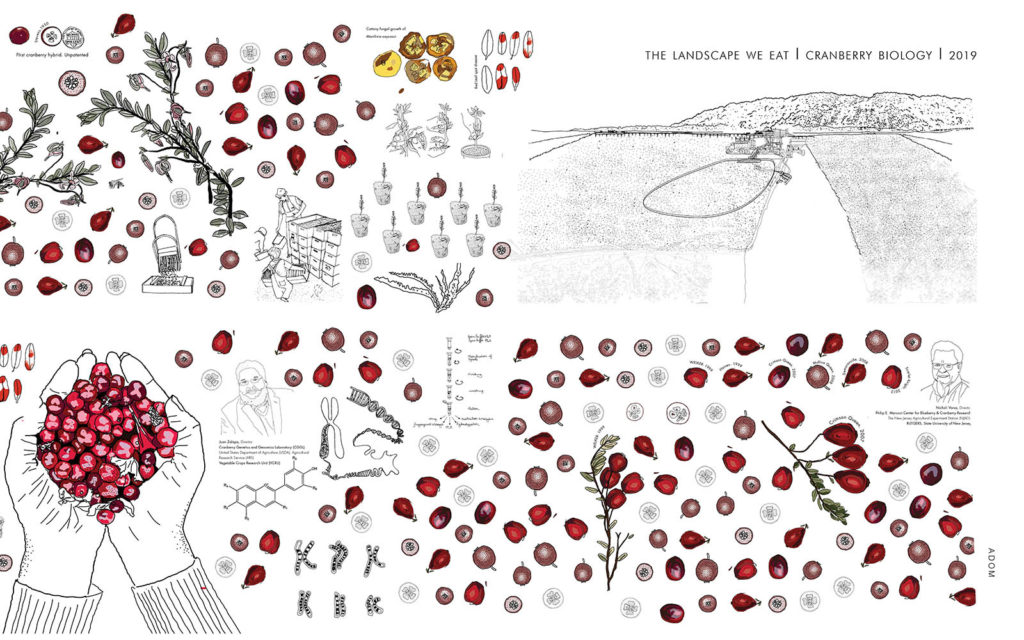
Cranberry Biology Analysis from The Landscape We Eat course
As COVID brought about food instability and other problems throughout global food systems, David saw her ongoing interests come into sharper relief. “This is a crucial moment to delve further into the relationship between food supply chains and food sovereignty for a nation,” she says. “The security of our food sources and availability is critical for the future of our communities. Understanding our food chains means understanding the origins of our food, the seeds used, chemicals, soil, water, field ownership, the architecture of the system, transport, storage, and human labor. I am interested in speculating on new forms of food networks for the city that can result in food sovereignty for communities in danger of famine, and allow for better ways of dwelling with care in the future.”
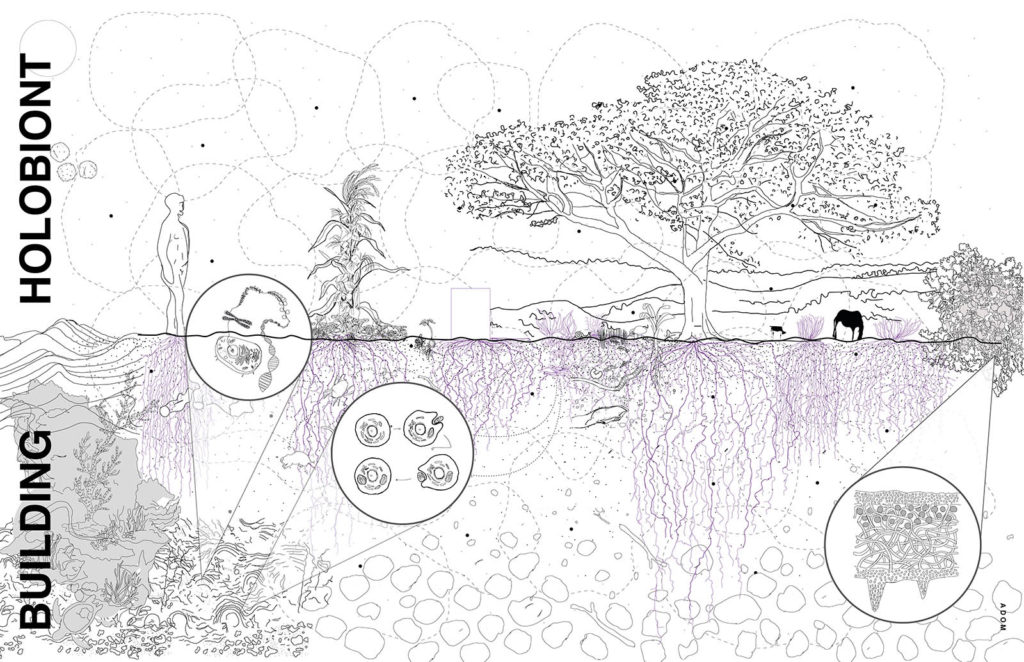
Comparison of the natural interactions of food systems, specifically the Three Sisters (corn, bean, squash), with the built environment today
Based in Mexico City, David will engage that city of 22 million people as a sort of research site while she consolidates previous quantitative research and begins applying it to case studies. She aims to organize her summer research according to the different food-supply spaces of Mexico City—including supermarkets, temporary markets, and organic farmers’ markets—while layering in a COVID-specific frame: food systems before, during, and after a pandemic condition. She hopes to produce a booklet cataloging methods of ensuring food sovereignty for Mexico City, and ideally for other cities and regions around the world. Bonvehi and Shoshan will advise David throughout her study.
Courtyard typology in the Italian countryside
Meanwhile, other students are taking up the holistic urban development process itself as a question worth interrogating. Nicolás Delgado Alcega (MArch ’20) has spent much of his last three semesters at the GSD researching cities and towns that dot the Italian countryside, with their medieval urban cores and attendant issues of agricultural land abandonment, soil erosion, depopulation, and disinvestment. Seeking adaptation strategies for these communities, he has seen a rising interest among younger generations in agriculture, motivated by economic downturns in cities, environmental degradation, and the loss of cultural heritage.
The research that Delgado Alcega develops over the summer will offer a detailed analysis of specific architectural and urban issues that his previous work revealed to be important in the socioeconomic transformations of the site of study. Aiming for concrete solutions, he will test whether the courtyard typology, as an intervention, might resolve or address issues of accessibility, structural stabilization, and sustainability that have emerged over his research thus far.
In particular, Alcega will take up the Italian town of Vallecorsa as a case study, in which he will propose employing the urban medieval block to accommodate emerging ways of life, programs, and pragmatic needs. Alcega benefits from testimonies and other research he gathered during a two-week site visit to Vallecorsa last winter, and he is grateful for the time and space in which to carefully process and strategize the research he has in hand.
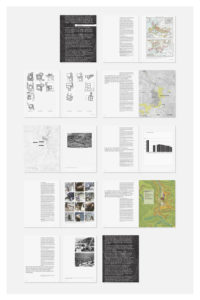
Vallecorsa Research Book Produced With J. Silvetti
Alongside his collaborator, Ginevra D’Agostino, a student at MIT’s School of Architecture and Planning, Delgado Alcega plans to continue a partnership with Vallecorsa’s Cooperativa Agricola La Carboncella, a local organization dedicated to rethinking the future of the area’s historic landscapes. With D’Agostino, he also hopes to incubate a related start-up venture through the Harvard Innovation Lab. Jorge Silvetti, the Nelson Robinson Jr. Professor of Architecture, will remain involved in Delgado Alcega’s work over the summer, having advised the project over several semesters.
With the SEF’s support, these threads of inquiry may extend from Delgado Alcega’s previous coursework and into tangible plans and strategies for local communities. “These research grants have offered a great opportunity to further some of the work we’ve undertaken at the GSD, and begin to transition it toward applications that could have a place in addressing specific challenges through practice,” Delgado Alcega says. “The research grant will give me the unique opportunity to transition from academia to practice in a more meaningful way in the midst of today’s uncertainty.”
There is still time to support the GSD Student Emergency Fund. A donation of any amount will have a direct impact on student research and/or emergency needs. Give today.
Four recent graduates named 2020-2021 Irving Innovation Fellows
Four recent graduates have been selected as Irving Innovation Fellows for the 2020-2021 academic year. Established as part of a gift from the John E. Irving Family in 2013, the Fellowship offers recipients a platform for continued work with the Harvard Graduate School of Design beyond their time as students. This year’s cohort will be affiliated with the Innovation Task Force, which formed in the wake of the COVID-19 pandemic to research and develop new innovations in virtual design pedagogy.
With degrees in Urban Design, Landscape Architecture, Architecture, and the Master in Design Students program, this year’s recipients are:
Sarah Fayad (MLAUD ’20)
Isabella Frontado (MDes ADPD/ MLA I ’20)
Gia Jung (MArch I ’20)
Ian Miley (MArch I AP ’20)
“The applications were incredibly impressive,” said Sarah M. Whiting, Dean and Josep Lluís Sert Professor of Architecture. “It’s uplifting to see the what extraordinary talent is coursing through the school. Previous recipients have remarked on the Fellowship’s power to extend research and inquiry beyond the space of an academic term, to help bridge theory and practice, and to inspire new ways of researching and designing; I look forward to what this year’s talented cohort of Fellows will accomplish.”
GSD Radio: Broadcasting Black Voices Daily at 8:30 PM EDT
Daily at 8:30pm we will be broadcasting a Black voice: a speech, interview, lecture, or other form of audio on the GSD Radio
Announcing faculty appointments and promotions in urban design, architecture, and landscape architecture
The Harvard University Graduate School of Design is pleased to announce the following faculty appointments and promotions effective July 1, 2020:

Charlotte Malterre-Barthes appointed Assistant Professor of Urban Design. Malterre-Barthes was previously guest professor in the Architecture Department of TU Berlin, Malterre-Barthes has directed, managed, and taught the post-graduate Master of Advanced Studies in Urban Design at ETH Zurich over the last six years. She is also co-founder of OMNIBUS, an urban design laboratory focused on interdisciplinary exploration of community-building factors in various metropolitans contexts. Charlotte’s teaching and research interests are related to how struggling communities can gain greater access to resources, the mainstream economy, better governance, and ecological/social justice. She believes that educators and universities have an obligation to be responsive to the challenges of our urbanizing world, equipping young practitioners and researchers with both critical skills and design tools to address them. Her pedagogy is built on a research-based design approach for identifying urgent aspects of contemporary urbanization. Charlotte holds a PhD in Architecture from ETH Zurich, and master’s and bachelor’s degrees in architecture from the National School of Architecture of Marseille (ENSAM).

Yasmin Vobis appointed Assistant Professor of Architecture. Vobis currently serves as visiting professor of architecture at The Cooper Union, and has previously taught at Princeton University and the Rhode Island School of Design. She sees the academy as an experimental platform for testing and exchanging ideas about architecture; rather than retreat from the issues of today’s political, social, and environmental context, her teaching aims to foster curiosity in these complexities and foster dialogue through design. Yasmin is co-principal of Ultramoderne, an award-winning architecture and design firm located in Providence, Rhode Island; the office is committed to creating architecture and public spaces that are at once modern, playful, and generous. Their view that architecture is not a boutique luxury, but plays an important role in all aspects of urban life, has driven them to mine the rich possibilities for contact between the discipline and the everyday. Yasmin received her bachelor’s degree from the University of California at Berkeley and her master’s degree from Princeton University’s School of Architecture.

Sara Zewde appointed Assistant Professor in Practice of Landscape Architecture. Zewde is a founding principal of Studio Zewde, a design firm practicing at the intersection of landscape architecture, urbanism, and public art. Sara’s practice and research start from her contention that the discipline of landscape architecture is tightly bound by precedents and typologies rooted in specific traditions that must be challenged. Sara most recently was Adjunct Assistant Professor at Columbia University’s GSAPP, and prior to that, she held an appointment as Race and Gender in the Built Environment Fellow at the University of Texas School of Architecture. She offers curriculum that is expressly connected to current sociopolitical debates, giving students an opportunity to actively take part in forming the links between their design education and the movements shaping the world they live in. Sara is a GSD alumna, specifically of the Department of Landscape Architecture; she also holds a master’s degree in city planning from MIT, and a bachelor’s degree in sociology and statistics from Boston University.

Stephen Gray promoted to Associate Professor of Urban Design. Gray has served as Assistant Professor of Urban Design since July 1, 2015. In addition to his role as Assistant Professor, Gray serves as the Co-Chair of the GSD Diversity Council. Gray also serves on the GSD Review Board, and is a coordinating faculty member for the GSD’s Design Discovery program.
Gray’s interests center on understanding political and cultural contexts of urban design; socio-ecological urban design approaches to resilience; and the intersectionality of humanitarian aid and urban design. His research and practice interrogate design’s contribution to, and complicity with, structural and infrastructural racism, and develop research and design methodologies that address issues of equity, access, social justice, and precarity at the scales of infrastructure, communities, metropolitans, and the globe.
Gray focuses his teaching primarily on the American city, and often on Boston and the Boston region. Gray’s courses include Elements of Urban Design and Cities by Design II, both of which Gray has been instrumental in re-orienting more explicitly toward questions of social equity, affordability, access, and socio-ecological resilience, as well as the political and procedural realities of urban design implementation. In Urban Design and the Color-Line, Gray interrogates urban design’s role in the production and elimination of structural racism and racial segregation in American cities. In 2015, he founded Grayscale Collaborative to further expand thinking and work at the intersection of urban design research and practice.
Gray earned a Bachelor of Architecture from the University of Cincinnati, and a Master of Architecture in Urban Design (MAUD) from the GSD, where he received the Thesis Prize for Urban Design and the Award for Outstanding Leadership in Urban Design. He has been tapped to serve on several Urban Land Institute (ULI) advisory panels, and has been nationally recognized by the American Institute of Architects (AIA) for his contributions to urban design thinking in the U.S. context with the National AIA Honor Award, the highest honor given to individual associate AIA members.

Holly Samuelson promoted to Associate Professor of Architecture. Samuelson has served as Assistant Professor of Architecture since July 30, 2013. In addition to her role as Assistant Professor, Samuelson serves as Co-Head of the Master in Design Studies in Energy and Environment. Samuelson also serves as one of the core faculty members for the Harvard Center for Green Buildings and Cities, and is a faculty advisor for the GSD’s Executive Education programs.
Samuelson’s research focuses on energy conservation and occupant behavior and health, utilizing computerized simulation to help the building industry mitigate and adapt to climate change while providing healthier spaces for occupants. Her work is characterized by a broad interdisciplinary lens and deep technical capacity on building performance simulation and its application/implication for architectural design and real estate. Samuelson’s courses include Environmental Systems in Architecture; Energy Simulation; Daylighting; and Environment, Economics, & Enterprise.
Prior to joining Harvard, Samuelson practiced full-time as a licensed architect and sustainable design consultant. As an architect, her work ranged in scale from a small museum for interactive art to a 100 acre master plan for Boston’s Fort Point Channel area with a primary focus on large-scale commercial buildings. She has worked on dozens of LEED projects and taught LEED workshops nationally and abroad. Her collaborative design work has been featured in the Boston Globe and honored by the Boston Society of Architects.
Samuelson earned a Doctor of Design and Master in Design Studies with distinction from the GSD, where she was awarded the Gerald M. McCue medal. She earned a Bachelor of Architecture with honors from Carnegie Mellon where she was awarded the American Institute of Architects Henry Adams Gold Medal. She has contributed articles to Building and Environment, The Journal of Building Performance Simulation, and The Journal of Environmental Management.
Yotam Ben Hur awarded KPF Foundation’s Paul Katz Fellowship
Harvard Graduate School of Design’s Yotam Ben Hur (MArch ’20) is one of two recipients of the Kohn Pedersen Fox Foundation’s 2020 Paul Katz Fellowship, an internationally recognized award that honors the life and work of former KPF Principal Paul Katz. The GSD’s Ian Miley (MArch ’20) was also recognized with one of two honorable mentions.
The KPF Foundation sponsors a series of annual fellowships to support emerging designers and advance international research. According to KPF, the Paul Katz Fellowship is given each year to assist international students in studying issues of global urbanism. The award is open to students enrolled in a masters of architecture program at five East Coast universities at which Katz studied or taught: Harvard, Princeton, Yale, Columbia, and the University of Pennsylvania.
KPF focuses each annual iteration of the Paul Katz Fellowship on a different global city. This year’s fellowship is tied to Mexico City; previous cities include Tel Aviv, Sydney, London, and Tokyo. Given the ongoing COVID-19 pandemic, KPF has announced that they will pause any travel requirements, and will distribute half of the $25,000 travel stipend as a financial award to each winner.
For the fellowship, Ben Hur submitted a research proposal examining the relationship between nature and architecture in peri-urban Mexico City with a concentration on the region’s informal settlements and their effect on the ecological water crisis the city is facing. Farshid Moussavi, professor in Practice of Architecture, was Ben Hur’s faculty advisor; Jacob Reidel, assistant professor in Practice of Architecture, and Eric Höweler, associate professor of Architecture, served as faculty reviewers.
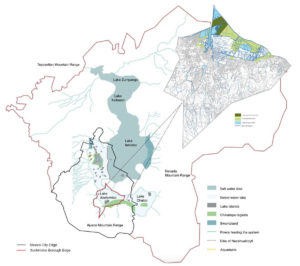
“My proposal was ignited by the accumulation of different experiences and lessons I’ve gained while being at the GSD,” Ben Hur says. Reflecting on his proposal, he emphasizes the value of looking outward into the countryside rather than remaining focused on urban or familiar surroundings. He considered the complexities and challenges of designing living spaces for high-density environments characterized by informal development, as well as what he describes as “our constant battle with climate change, and our desire to find balance between the natural and the built environments.”
“Mexico City has entered a stage in which, on the one hand, there is a great need for public works, housing, and service infrastructure for the peri-urban poor, and on the other, huge pressures are being placed to conserve the surrounding environment on the verge of a climate crisis,” Ben Hur writes in his research proposal. “In this constant battle between architecture and nature, between the need to urbanize land and the desire to conserve and restore the landscape, architects and planners must intervene and redefine the relationships between the two entities, to end the loss and offer a solution of coexistence—an approach that does not separate the two realities, but rather sees the informal settlements and the natural, protected areas as components of the same ecosystem.”

Ben Hur and Miley follow a legacy of GSD students who have been honored with the Paul Katz Fellowship, including 2019 winner Miriam Alexandroff (MArch ’19) and 2018 winner Sonny Xu (MArch ’18, MLA ’18).
The KPF Foundation also organizes other fellowships, lectureships, and education-minded programs. Last year, the GSD’s Peteris Lazovskis (MArch ’20) was among three recipients of the KPF Traveling Fellowship, earning a $10,000 grant to support a summer of travel and exploration before a final year at school.
